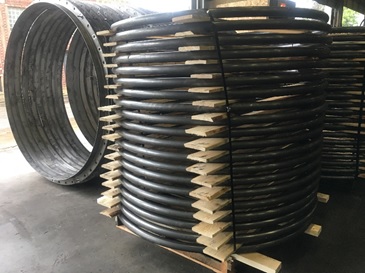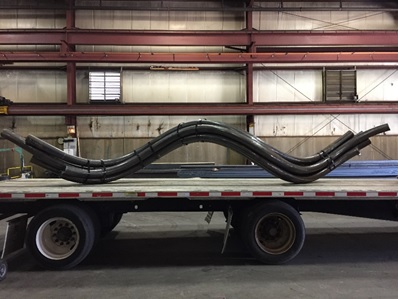Metal is the go-to material of choice when deciding on the type of construction/fabrication for many architectural and industrial applications. Its strength and malleability, or the material’s ability to be formed, lends itself well to be functional and aesthetically appealing. When metals are processed/prepped correctly they can be formed into complex geometries and are capable of displaying a lustrous finish. Many fabricators hold rather primitive and limiting capabilities with respect to metal bending and forming, so it is often the case that any requirements for curved/bent metal are sourced through a bender/roller. Bender/rollers are specialty fabricators whose core competencies are the custom bending and forming or “rolling” of metals as it is called; this is due to the roller bending method used by a vast majority of bending/rolling companies. A majority of these companies specialize in the bending/rolling of structural steel but the machinery used to accomplish this is also the same machinery used to bend/roll aluminum and stainless steels; also exotic metals and specialty alloys are able to be bent/formed with specialized tooling, methods and under certain conditions i.e. the cleaning of rolls and equipment to prevent cross-contamination and/or impregnation of alloys.

Bender Rollers provide custom metal bending services much the same that service centers provide metal/steel according to customer request. Service centers stock and ship material in commodity sizes, shapes and lengths. They also provide value-added services according to customer specifications such as cutting those shapes and lengths to different sizes. Some service centers will also drill and tap holes and or provide beveling and or polishing services upon request. But one thing that almost none of the services centers provide as a value-added service is in-house custom bending/rolling/forming. When a project details curved/bent members it is nearly always the case that the required metal bending services will need to be sourced through a bender/roller. Service centers from time to time will offer curved/bent members but more often than not these members are acquired through the subcontracting of a bender/roller to supply the curved/bent members.
To contract a bender roller for custom metal bending services, architectural/structural and or mechanical drawings/prints will be required. These prints frequently come from engineering teams using computer-aided drawing techniques to ensure the detailed curved members have the correct radius and arc length as required by the project. These drawings/print packages can be sent directly to the bender/roller who will then gather from the prints the necessary information required to price and perform the required metal bending services. A quote will be rendered per each request and if the desire to proceed on placing an order is there, a purchase order will be issued; then terms and payment options will be established. The required members are then bent/formed specifically per job and delivered to an address per purchase order specifications.

Bender/rollers each have their own proprietary processes/methods and specialty equipment for bending/forming so not all metal bending services are rendered equally across the industry. Depending on who is contracted, one bender/roller vs the other may hold very specialized capabilities with respect to the size and weight of members being formed and or the complexity of the geometry required by the metal bending service. It is often recommended to reach out to bender/rollers early on in a project for their consultation on any metal bending services required.







